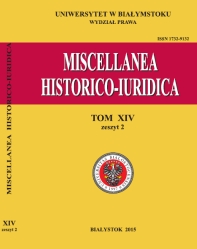Obywatelstwo państwa polskiego w świetle orzecznictwa Najwyższego Trybunału Administracyjnego 1922–1939
Citizenship of the Polish State in the Light of the Decisions Taken by the Supreme Administrative Tribunal in 1922–1939
Author(s): Dorota MalecSubject(s): Politics / Political Sciences, History, Law, Constitution, Jurisprudence, History of Law, Public Law, Interwar Period (1920 - 1939)
Published by: Wydawnictwo Uniwersytetu w Białymstoku
Keywords: right to citizenship; judicial decisions; Supreme Administrative Tribunal; administrative courts; public law; Second Republic of Poland; Polish legal history; legal history
Summary/Abstract: After Poland restored its independence in 1918, the subject of Polish citizenship was regulated by the provisions of international law, particularly those found in the Versailles Treaty of 24 June 1919, as well as by those formulated in the Treaty with Austria signed in St. Germain en Laye on 10. Sept. 1919, those laid down in the Treaty of Riga of 18 March 1921, and additionally, by the provisions of domestic law, namely the provisions of the Statute on Citizenship of the Polish State of 20 Jan. 1920. It was as early as during the work on the aforementioned Statute that there appeared problems that, in the years which followed, became detectable in decisions taken by the Supreme Administrative Tribunal. It was the latter that – within the scope of its competence – controlled the legality of decisions made on the occasion of adjudicating in matters concerned with the application of provisions on citizenship of the Polish state. In the judicial decisions of the Tribunal, which was established in 1922, there dominated those concerned with the certification of citizenship for which there applied the individuals who acquired the citizenship by virtue of law. The Tribunal also frequently decided in matters referring to making an option of citizenship, the option being allowed by the Versailles Treaty. The Tribunal cautiously appraised the proceedings designed to expel an individual from the territory of Poland. What the Tribunal considered to be a defect in the proceedings was inter alia too general a justification of decisions that referred to the refusal of granting citizenship to the person applying for it. Although the doctrine of the time regarded the act of granting citizenship as the decision that the competent organ made within its discretionary power, the Supreme Administrative Tribunal oversaw each case to ensure that the boundaries of the discretionary power were not exceeded. Likewise, in each case the Tribunal considered itself to be the organ that was competent to check the regularity of proceedings. In each case the Tribunal made a penetrating interpretation of provisions and would repeatedly return to the most difficult questions. Among the latter there were inter alia the interpretation of such notions as affiliation with the commune, domicile and the place of settling and military service as titles that justified the acquisition of citizenship. As a result of its control over the administrative practice, the Tribunal managed to reveal many infringements of provisions. This led to the quashing of decisions that were subject to complaints. In this respect the activities of the Tribunal deserve credit.
Journal: Miscellanea Historico-Iuridica
- Issue Year: 14/2015
- Issue No: 2
- Page Range: 73-96
- Page Count: 24
- Language: Polish

